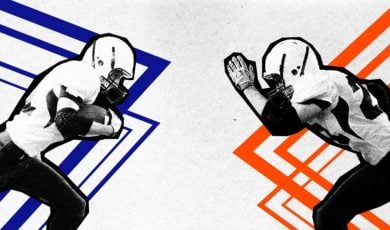Missouri is set to become the 41st U.S. state to offer legal sports betting on Dec. 1, 2025, officially launching Missouri sports betting for both mobile and retail users. The Missouri Gaming Commission will regulate the industry and issue licenses to qualified operators.
Preparations are already underway, with nine sportsbooks licensed to go live on day one. Bettors in the Show-Me State can begin preregistration on Nov. 17. Several national operators — including FanDuel, DraftKings, BetMGM, Bet365, Caesars, Fanatics, and Underdog — have received temporary online licenses, signaling a competitive launch marketplace.
Analysts project the Missouri market could generate $3.4 billion in wagers in its first year.
Missouri sports betting and neighboring state comparison
Missouri’s sports betting market will operate under a moderate 10% tax rate as outlined in Amendment 2 — not so high that it discourages operators, yet higher than low-tax neighbors like Iowa.
The law also limits how promotional credits are taxed, a key factor in determining net state revenue. The state’s mix of mobile and retail sportsbooks allows wagers via approved apps statewide, as well as at partnered casinos and stadium venues.
Iowa: Low taxes, strong competition
Iowa remains one of the most operator-friendly states in the region, taxing gross sports betting revenue at 6.75%. The low rate allows operators to offer aggressive promotions, attracting top national sportsbooks. The state currently hosts about 14 online platforms and handles roughly $1.5–$2 billion in wagers annually.
Compared with Iowa, Missouri’s moderate tax may slightly limit promotional spending, but the larger population and untapped sports fan base give Missouri a greater overall market potential. Even with Iowa’s operator-friendly environment, Missouri sports betting is expected to generate significantly higher handle in its first year.
Kansas: early sports betting launch, modest growth
Kansas launched sports betting in 2022 with a 10% tax rate, mirroring Missouri’s structure. The smaller market has produced modest tax revenue to date, with six operators currently active, including Bet365, DraftKings, FanDuel, Fanatics, Caesars and BetMGM.
Kansas handled approximately $1.85 billion in wagers in its first year, collecting around $7 million in state tax revenue. Missouri’s larger population and broader operator base suggest it could surpass Kansas’ handle and revenue potential, provided mobile operations and promotions meet expectations.
Illinois: high tax model shapes operator strategy
Illinois uses a tiered tax system starting at 20% and rising to 40% for the largest operators. While this structure has boosted state revenue, it constrains operator spending on promotions. Ten platforms operate statewide, including ESPN Bet, Fanatics, FanDuel, Bet365, BetMGM, BetRivers, Caesars, DraftKings, Hard Rock Bet and Circa Sports.
Missouri’s moderate tax positions it between Illinois’ high-tax environment and lower-tax neighbors like Iowa. While Illinois generates more revenue per wager, Missouri’s balanced tax and large untapped population could allow operators to offer more competitive promotions, potentially helping Missouri surpass Illinois’ handle in the early months.
Arkansas: Limited operators, smaller market
Arkansas taxes sports betting at 13% on the first $150 million in revenue, rising to 20% above that threshold. Retail betting launched in 2019, followed by mobile wagering through a small number of casino-affiliated apps. Currently, only three operators are active, making Arkansas a smaller, more restricted market.
By comparison, Missouri’s lower tax and broader slate of licensed operators create a more competitive and expansive market. While Arkansas’s tiered tax generates higher revenue on large wins, its limited operator count and population constrain growth. Missouri’s moderate tax, multiple operators, and strong local demand suggest it could quickly outpace Arkansas in total wagers and operator activity.
Missouri sports betting bonuses and operator strategy
Missouri’s 10% tax and promotional deductions are expected to appeal to national operators entering the market. While the state may not generate as much revenue as Illinois’ high-tax model and is slightly less favorable to operator margins than Iowa’s low-tax structure, early preregistration offers and launch promotions should be attractive to bettors. The terms of these initial Missouri sportsbook promos will ultimately be shaped by Missouri’s tax and promotional policies.
Local fans will drive Missouri’s sports betting market
Missouri sits between large markets like Illinois and smaller neighboring states. Early wagering is likely to be driven by local sports fans, including those who previously crossed state lines to bet in Kansas or Illinois. Partnerships between operators and Missouri’s professional teams are expected to support adoption and brand awareness.
Two key factors will shape Missouri’s early rollout:
- Regional competition: Neighboring low-tax states such as Iowa and established markets like Illinois will challenge Missouri to balance strong consumer offers with consistent state revenue.
- Tax mechanics and deductions: While the 10% headline rate is competitive, promotional-credit rules and taxable-revenue calculations will determine actual state revenue and operator behavior.
Final take: Missouri positioned for strong betting launch
Missouri’s sports betting tax strikes a middle ground — higher than Iowa’s, lower than Illinois’, and more scalable than Arkansas’ limited system. The state is positioned for a competitive market with multiple major operators.
For bettors, the launch promises a wide range of options, attractive promotions, and a seamless experience from day one. For Missouri, the market represents a new revenue stream, keeps funds local, and offers fans more ways to engage with their favorite teams.









